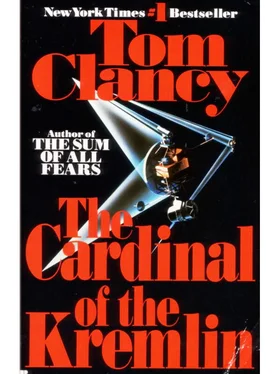Tom Clancy - The Cardinal of the Kremlin
Здесь есть возможность читать онлайн «Tom Clancy - The Cardinal of the Kremlin» весь текст электронной книги совершенно бесплатно (целиком полную версию без сокращений). В некоторых случаях можно слушать аудио, скачать через торрент в формате fb2 и присутствует краткое содержание. Год выпуска: 1988, Жанр: Триллер, на английском языке. Описание произведения, (предисловие) а так же отзывы посетителей доступны на портале библиотеки ЛибКат.
- Название:The Cardinal of the Kremlin
- Автор:
- Жанр:
- Год:1988
- ISBN:нет данных
- Рейтинг книги:3 / 5. Голосов: 1
-
Избранное:Добавить в избранное
- Отзывы:
-
Ваша оценка:
- 60
- 1
- 2
- 3
- 4
- 5
The Cardinal of the Kremlin: краткое содержание, описание и аннотация
Предлагаем к чтению аннотацию, описание, краткое содержание или предисловие (зависит от того, что написал сам автор книги «The Cardinal of the Kremlin»). Если вы не нашли необходимую информацию о книге — напишите в комментариях, мы постараемся отыскать её.
The Cardinal of the Kremlin — читать онлайн бесплатно полную книгу (весь текст) целиком
Ниже представлен текст книги, разбитый по страницам. Система сохранения места последней прочитанной страницы, позволяет с удобством читать онлайн бесплатно книгу «The Cardinal of the Kremlin», без необходимости каждый раз заново искать на чём Вы остановились. Поставьте закладку, и сможете в любой момент перейти на страницу, на которой закончили чтение.
Интервал:
Закладка:
But there was nothing foolish here, was there? No, and there wasn't anything accidental either. If the techniques on this line were odd, they were also professional. There was another level to this, something that the interrogator didn't have yet.
"I think that tomorrow, you and I will ride the Metro."
Colonel Filitov woke up without a pounding in his head, which was pleasure enough. His "normal" morning routine was not terribly different from the other sort, but without the pain and the trip to the baths. He checked the diary tucked away in the desk drawer after he dressed, hoping that he'd be able to destroy it, as per his usual procedure. He already had a new blank diary that he'd begin with when this one was destroyed. There had been hints of a new development on the laser business the previous day, plus a paper on missile systems that he'd be seeing the following week.
On entering the car, he settled back, more alert than usual, and looked out the window during the drive into work. There were a number of trucks on the street, early as it was, and one of them blocked his view of a certain piece of curb. That was his "data-lost" signal. He was slightly annoyed that he couldn't see where it was, but his reports were rarely lost, and it didn't trouble him greatly. The "transfer successful" signal was in a different place, and was always easy to see. Colonel Filitov settled back in his seat, gazing out the window as he approached the spot… there. His head turned to track on the spot, looking for the mark… but it wasn't there. Odd. Had the other marker been set? He'd have to check that on the trip home tonight. In his years of work for CIA, several of his reports had been lost one way or another, and the danger signal hadn't been set, nor had he gotten the telephone call asking for Sergey that would tell him to leave his apartment at once. So there was probably no danger. Just an annoying inconvenience. Well. The Colonel relaxed and contemplated his day at the Ministry.
This time the Metro was fully manned. Fully a hundred Second Directorate men were in this one district, most dressed like ordinary Moscovites, some like workmen. These latter were operating the "black" phone lines installed along with electrical service panels throughout the system. The interrogator and his prisoner were riding trains back and forth on the "purple" and "green" lines, looking for a well-dressed woman in a Western coat. Millions of people traveled the Metro every day, but the counterintelligence officers were confident. They had time working for them, and their profile of the target – an adventuress. She was probably not disciplined enough to separate her daily routine from her covert activities. Such things had happened before. As a matter of faith – shared with their counterparts throughout the world – the security officers held that people who spied on their homeland were defective in some fundamental way. For all their cunning, such traitors would sooner or later connive at their own destruction.
And they were right, at least in this case. Svetlana came onto the station platform holding a bundle wrapped in brown paper. The courier recognized her hair first of all. The style was ordinary, but there was something about the way she held her head, something intangible that made him point, only to have his hand yanked down. She turned and the KGB Colonel got a look at her face. The interrogator saw that she was relaxed, more so than the other commuters who displayed the grim apathy of the Moscovite. His first impression was of someone who enjoyed life. That would change.
He spoke into a small radio, and when the woman got on the next train, she had company. The "Two" man who got on with her had a radio earpiece, almost like a hearing aid. Behind them at the station, the men working the phone circuit alerted agents at every station on the line. When she got off, a full shadow team was ready. They followed her up the long escalator onto the street. Already a car was here, and more officers began the surveillance routine. At least two men always had visual contact with the subject, and the close-in duty rotated rapidly among the group as more and more men joined in the chase. They followed her all the way to the GOSPLAN Building on Marksa Prospekt, opposite the Hotel Moscow. She never knew that she was being followed, and never even attempted to look for evidence of it. Within half an hour, twenty photographs were developed and were shown to the prisoner, who identified her positively.
The procedure after that was more cautious. A building guard gave her name to a KGB officer who admonished him not to discuss the inquiry with anyone. With her name, a full identity was established by lunchtime, and the interrogator, who was now running all aspects of the case, was appalled to learn that Svetlana Vaneyeva was the child of a senior Central Committee member. That would be a complication. Quickly, the Colonel assembled another collection of photographs and reexamined his prisoner, but yet again he selected the right woman from a collection of six. The family member of a Central Committee man was not someone to – but they had identification, and they had a major case. Vatutin went to confer with the head of his directorate.
What happened next was tricky. Though deemed all-powerful by the West, the KGB has always been subservient to the Party apparatus; even the KGB needed permission to trifle with a family member of so powerful an official. The head of the Second Directorate went upstairs to the KGB Chairman. He returned thirty minutes later.
"You may pick her up."
"The Secretary of the Central Committee–"
"Has not been informed," the General said.
"But–"
"Here are your orders." Vatutin took the handwritten sheet, personally signed by the Chairman.
"Comrade Vaneyeva?"
She looked up to see a man in civilian clothes – GOSPLAN was a civilian agency, of course – who stared at her oddly. "Can I help you?"
"I am Captain Klementi Vladimirovich Vatutin of the Moscow Militia. I would like you to come with me." The interrogator watched closely for a reaction, but got nothing.
"Whatever for?" she asked.
"It is possible that you can help us in the identification of someone. I cannot elaborate further here," the man said apologetically.
"Will it take long?"
"Probably a few hours. We can have someone drive you home afterward."
"Very well. I have nothing critical on my desk at the moment." She rose without another word. Her look at Vatutin betrayed a certain sense of superiority. The Moscow Militia was not an organization that was lavished with respect by local citizens, and the mere rank of captain for a man of his age told her much of his career. Within a minute she had her coat on and the bundle under her arm, and they headed out of the building. At least the Captain was kulturny , she saw, holding the door open for her. Svetlana assumed from this that Captain Vatutin knew who she was – more precisely, who her father was.
A car was waiting and drove off at once. She was surprised at the route, but it wasn't until they drove past Khokhlovskaya Square that she was sure.
"We're not going to the Ministry of Justice?" she asked.
"No, we're going to Lefortovo," Vatutin replied offhandedly.
"But–"
"I didn't want to alarm you in the office, you see. I am actually Colonel Vatutin of the Second Chief Directorate." There was a reaction to that, but Vaneyeva recovered her composure in an instant.
"And what is it that I am to help you with, then?"
She was good, Vatutin saw. This one would be a challenge.
The Colonel was loyal to the Party, but not necessarily to its officials. He was a man who hated corruption almost as much as treason. "A small matter – you'll doubtless be home for dinner."
Читать дальшеИнтервал:
Закладка:
Похожие книги на «The Cardinal of the Kremlin»
Представляем Вашему вниманию похожие книги на «The Cardinal of the Kremlin» списком для выбора. Мы отобрали схожую по названию и смыслу литературу в надежде предоставить читателям больше вариантов отыскать новые, интересные, ещё непрочитанные произведения.
Обсуждение, отзывы о книге «The Cardinal of the Kremlin» и просто собственные мнения читателей. Оставьте ваши комментарии, напишите, что Вы думаете о произведении, его смысле или главных героях. Укажите что конкретно понравилось, а что нет, и почему Вы так считаете.






![Александр Ирвин - Tom Clancy’s The Division 2. Фальшивый рассвет [litres]](/books/417744/aleksandr-irvin-tom-clancy-s-the-division-2-falsh-thumb.webp)





